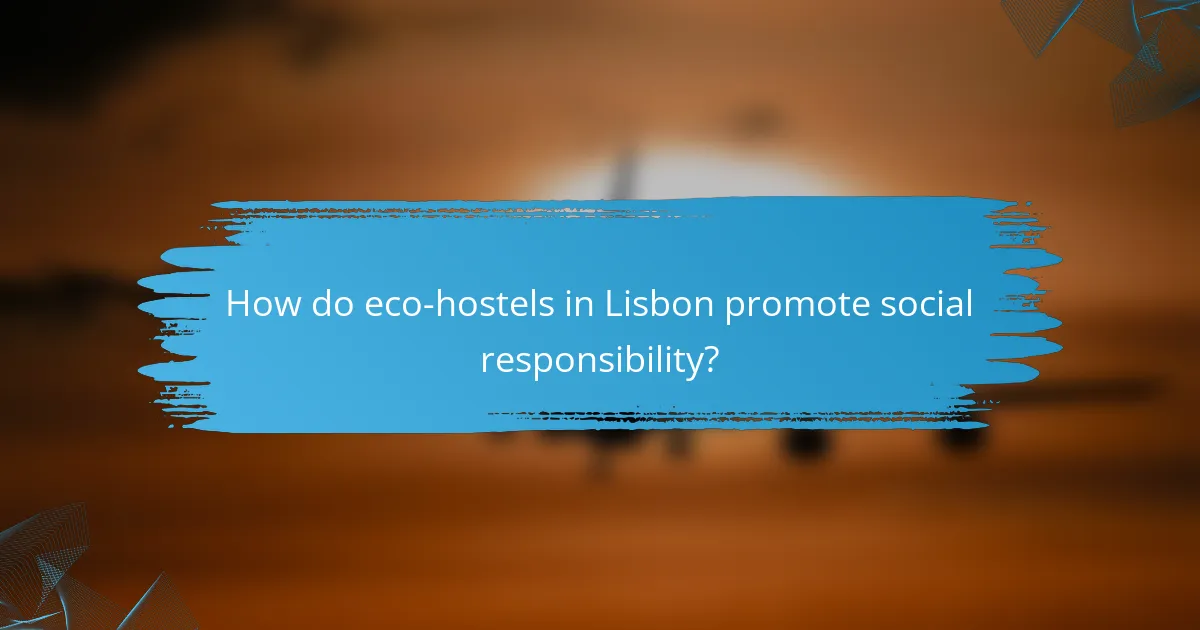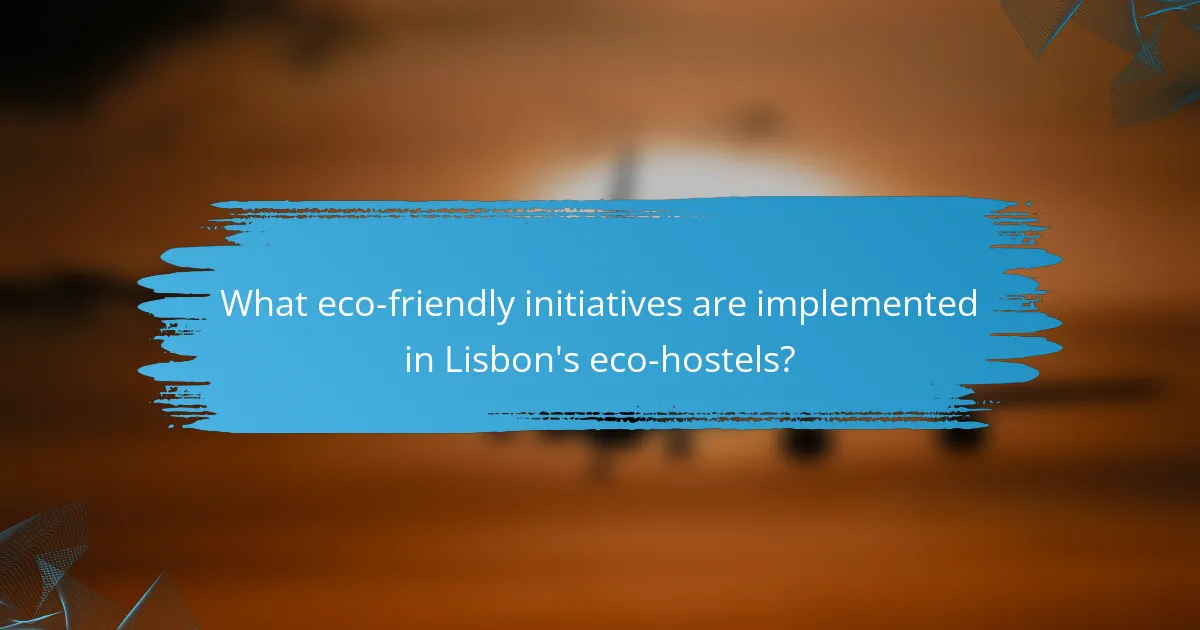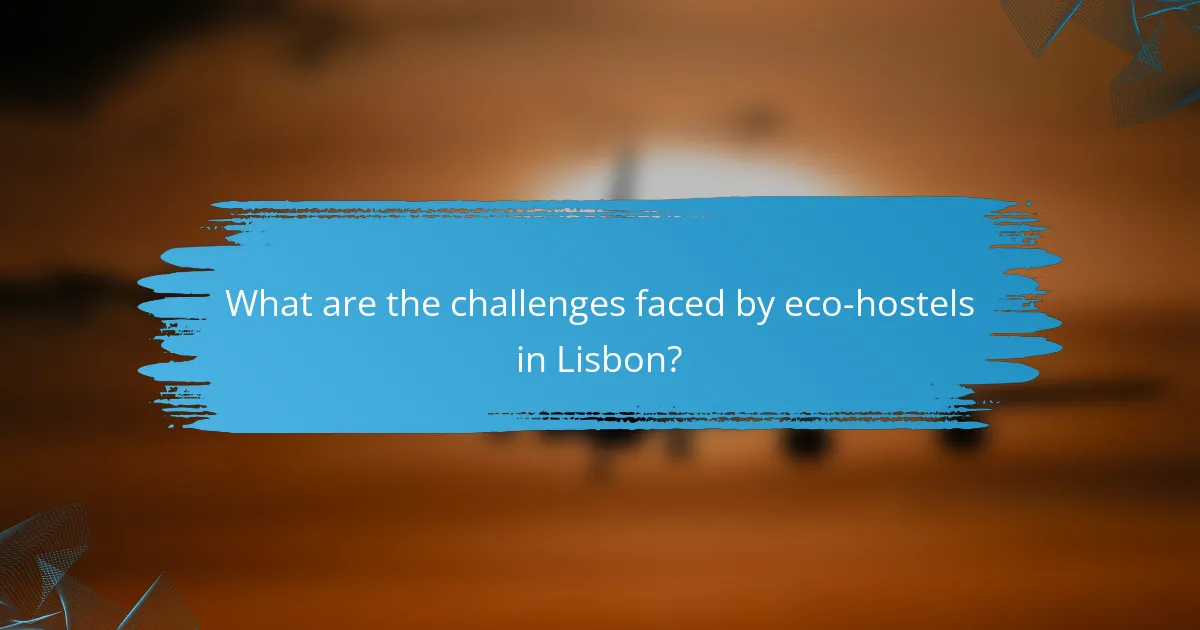Eco-hostels in Lisbon offer an affordable and sustainable lodging option for travelers seeking budget-friendly accommodations. These hostels emphasize social responsibility through community engagement and support for local economies. They implement eco-friendly initiatives such as waste reduction and energy efficiency, enhancing the travel experience while minimizing environmental impact. Guests can also participate in immersive experiences that promote sustainability and cultural exchange.

What makes eco-hostels in Lisbon affordable?
Eco-hostels in Lisbon are affordable due to their emphasis on sustainability and community engagement. These hostels often utilize eco-friendly practices, reducing operational costs. Shared accommodations and communal spaces lower individual expenses, while local partnerships provide discounts and promote social responsibility. Many eco-hostels also prioritize local sourcing, further enhancing affordability through reduced transportation costs.
How do pricing strategies differ among eco-hostels?
Pricing strategies among eco-hostels in Lisbon vary based on location, amenities, and sustainability practices. Some eco-hostels offer budget-friendly rates to attract environmentally conscious travelers, while others may charge premium prices for unique eco-friendly features.
For instance, hostels with extensive green initiatives, such as solar energy and organic meals, often have higher rates. Conversely, basic eco-hostels focusing on affordability might provide essential services without extra frills.
In general, eco-hostels emphasize social responsibility, which can influence pricing. Many implement sliding scales or discounts for longer stays, fostering community engagement while remaining accessible.
Overall, the diversity in pricing reflects the balance between affordability and commitment to sustainability, appealing to a range of eco-minded guests.
Which factors contribute to lower costs in eco-hostels?
Lower costs in eco-hostels stem from various factors such as sustainable practices, community involvement, and resource efficiency. Eco-hostels often utilize renewable energy sources, reducing utility expenses. They frequently engage with local suppliers, which lowers transportation costs and supports the community. Shared facilities, like kitchens and common areas, promote cost-sharing among guests. Additionally, eco-hostels typically prioritize minimalistic designs, which can lower construction and maintenance costs. These attributes collectively enhance affordability while promoting social responsibility and eco-friendly initiatives.
What are the average rates for eco-hostels in 2025?
The average rates for eco-hostels in Lisbon in 2025 are expected to range from €30 to €70 per night. Factors influencing these rates include location, amenities, and sustainability initiatives. Eco-hostels often prioritize social responsibility, offering affordable options while promoting environmental awareness. Prices may vary based on seasonal demand and the unique attributes of each hostel.
How do eco-hostels compare to traditional hostels in terms of pricing?
Eco-hostels in Lisbon typically offer more affordable pricing compared to traditional hostels, reflecting their social responsibility and eco-friendly initiatives. While traditional hostels may charge around 30-50 euros per night, eco-hostels often range from 25-45 euros, providing budget-friendly options. Additionally, eco-hostels may include sustainable practices that enhance guest experiences, such as organic meals and community activities. This unique approach attracts environmentally conscious travelers who prioritize affordability alongside social and ecological impact.

How do eco-hostels in Lisbon promote social responsibility?
Eco-hostels in Lisbon promote social responsibility through community engagement, sustainable practices, and support for local economies. They often collaborate with local organizations to offer educational programs and volunteer opportunities, fostering a sense of community. Many eco-hostels implement eco-friendly initiatives such as waste reduction, energy efficiency, and sourcing local food. This commitment not only minimizes their environmental impact but also encourages guests to participate in sustainable tourism. By prioritizing social responsibility, these hostels enhance the travel experience while contributing positively to the local community.
What community initiatives are supported by eco-hostels?
Eco-hostels in Lisbon support various community initiatives focused on sustainability and social responsibility. They often engage in local environmental projects, promote cultural exchange, and collaborate with nearby businesses to foster economic growth. These initiatives include organizing beach clean-ups, offering workshops on sustainable practices, and providing support to local artisans. By prioritizing community involvement, eco-hostels enhance their eco-friendly mission while positively impacting Lisbon’s social fabric.
How do eco-hostels engage with local businesses?
Eco-hostels in Lisbon actively engage with local businesses to promote sustainability and community support. They often collaborate with nearby restaurants, artisans, and tour operators, creating mutually beneficial partnerships. These hostels may source organic food from local farms, offer workshops led by local craftspeople, or provide discounts for guests at nearby attractions. This engagement enhances the local economy while providing guests with authentic experiences. Additionally, eco-hostels frequently organize events that showcase local culture and products, fostering a sense of community and responsibility.
What role do eco-hostels play in supporting local culture?
Eco-hostels in Lisbon support local culture by promoting community engagement and sustainable practices. They offer travelers authentic experiences that connect them to local traditions. Many eco-hostels collaborate with local artisans, providing platforms for cultural exchange. This fosters economic growth and preserves cultural heritage. Their eco-friendly initiatives often include local sourcing of food and materials, further embedding them within the community.

What eco-friendly initiatives are implemented in Lisbon’s eco-hostels?
Lisbon’s eco-hostels implement various eco-friendly initiatives such as waste reduction, energy efficiency, and sustainable sourcing. Many hostels utilize solar panels for energy, promote recycling programs, and offer organic local food options. Some provide educational workshops on sustainability, enhancing guest awareness. These practices not only reduce the environmental impact but also foster a sense of community and social responsibility among travelers.
How do eco-hostels reduce their carbon footprint?
Eco-hostels reduce their carbon footprint through sustainable practices and eco-friendly initiatives. They utilize renewable energy sources, such as solar and wind power, to minimize reliance on fossil fuels. Many eco-hostels implement water conservation measures, including rainwater harvesting and low-flow fixtures.
Additionally, they often source food locally, reducing transportation emissions and supporting community agriculture. Eco-hostels frequently promote recycling and waste reduction programs, further decreasing their environmental impact. By fostering a culture of sustainability, these hostels encourage guests to adopt eco-conscious behaviors during their stay.
What sustainable practices are commonly adopted by eco-hostels?
Eco-hostels commonly adopt several sustainable practices to minimize their environmental impact. These include using renewable energy sources, implementing water conservation measures, and sourcing local, organic food. Many eco-hostels also incorporate waste reduction strategies, such as recycling and composting. Additionally, they often engage guests in eco-friendly activities, promoting awareness of sustainability.
Which certifications or standards do eco-hostels in Lisbon pursue?
Eco-hostels in Lisbon often pursue certifications such as Green Key, Eco-Label, and EarthCheck. These standards ensure eco-friendly practices and social responsibility. Many hostels also engage in local community initiatives and sustainability programs.

What unique experiences can guests expect at eco-hostels in Lisbon?
Guests at eco-hostels in Lisbon can expect immersive experiences focused on sustainability and community engagement. Unique offerings include organic meals sourced from local farms, workshops on eco-friendly practices, and opportunities to participate in community service projects. These hostels often feature green design elements, such as solar energy and water conservation systems, enhancing their commitment to environmental responsibility. Additionally, social events foster connections among travelers, creating a vibrant atmosphere that emphasizes shared values of sustainability and cultural exchange.
How do eco-hostels offer immersive cultural experiences?
Eco-hostels in Lisbon offer immersive cultural experiences through local engagement, sustainable practices, and community-driven activities. Guests often participate in workshops, cooking classes, and cultural tours led by locals. This fosters a deeper understanding of Portuguese traditions and lifestyles. Eco-hostels prioritize social responsibility, creating environments that encourage interaction among travelers and residents. Additionally, eco-friendly initiatives promote awareness of environmental issues, enhancing the cultural experience with a focus on sustainability.
What types of accommodations are available in eco-hostels?
Eco-hostels offer diverse accommodations, including shared dormitories, private rooms, and family suites. Shared dormitories promote social interaction and affordability, while private rooms provide privacy and comfort. Family suites cater to larger groups, often featuring eco-friendly amenities. Many eco-hostels incorporate sustainable design and communal spaces to enhance the guest experience.
Which activities are commonly organized by eco-hostels?
Eco-hostels commonly organize activities such as community clean-ups, eco-tours, workshops on sustainable practices, and cultural exchange events. These initiatives promote social responsibility and environmental awareness among guests. Eco-hostels in Lisbon often emphasize local engagement and offer unique experiences that reflect the city’s commitment to sustainability. Activities may include guided nature walks, cooking classes featuring local ingredients, and volunteer opportunities with local organizations.

How do eco-hostels cater to international travelers?
Eco-hostels in Lisbon cater to international travelers by offering affordable rates, promoting social responsibility, and implementing eco-friendly initiatives. These hostels provide budget-friendly accommodations, attracting backpackers and budget-conscious tourists. They often engage in local community projects, enhancing cultural exchange and supporting sustainable tourism. Eco-hostels typically utilize renewable energy sources, encourage recycling, and offer organic food options, aligning with the values of environmentally conscious travelers.
What amenities are tailored for diverse visitor needs?
Eco-hostels in Lisbon offer a variety of amenities tailored for diverse visitor needs. These include shared kitchens, communal lounges, and eco-friendly facilities that cater to budget travelers and social enthusiasts.
Key amenities are:
– **Flexible room options**: Dormitories and private rooms accommodate different group sizes.
– **Sustainable practices**: Solar energy, recycling programs, and water conservation initiatives enhance eco-friendliness.
– **Social spaces**: Common areas encourage interaction among guests, fostering a sense of community.
– **Local tours and activities**: Organized events promote cultural engagement and exploration of Lisbon.
– **Accessibility features**: Facilities are designed to be inclusive for guests with mobility challenges.
These amenities reflect the commitment of eco-hostels to affordability, social responsibility, and environmental sustainability.
How do eco-hostels ensure a welcoming environment for all guests?
Eco-hostels in Lisbon create a welcoming environment through inclusive practices and sustainable initiatives. They prioritize affordability while promoting social responsibility, ensuring all guests feel valued. Many eco-hostels feature communal spaces that encourage interaction, fostering a sense of community. Additionally, they often implement eco-friendly practices, such as using renewable energy and offering local organic food, which resonate with environmentally conscious travelers. These attributes not only enhance guest experience but also align with the values of sustainability and social equity.

What are the challenges faced by eco-hostels in Lisbon?
Eco-hostels in Lisbon face challenges related to affordability, competition, and sustainability practices. High operational costs can limit pricing strategies, making it difficult to attract budget-conscious travelers. Additionally, competition from traditional hostels and hotels creates pressure on eco-hostels to differentiate their offerings. Balancing eco-friendly initiatives with guest expectations can also pose challenges, as some sustainable practices may not align with the preferences of all visitors.
How do eco-hostels address sustainability-related challenges?
Eco-hostels address sustainability-related challenges by implementing eco-friendly practices, promoting social responsibility, and providing affordable accommodation. They often use renewable energy sources, minimize waste, and support local communities. For instance, many eco-hostels in Lisbon feature water-saving technologies and sustainable materials in their construction. These initiatives not only reduce their environmental impact but also encourage guests to adopt greener habits during their stay.
What common misconceptions exist about eco-hostels?
Many misconceptions about eco-hostels in Lisbon include the belief that they are expensive, uncomfortable, or lack amenities. In reality, eco-hostels often provide affordable rates, prioritize guest comfort, and offer modern facilities. Additionally, some people think eco-hostels are only for young backpackers, but they attract a diverse range of travelers seeking sustainable options. Lastly, there is a misconception that eco-hostels do not contribute to the local community, whereas many engage in social responsibility initiatives that benefit the surrounding area.
How do eco-hostels navigate regulatory hurdles?
Eco-hostels in Lisbon navigate regulatory hurdles by prioritizing compliance with local laws and sustainable practices. They often collaborate with city officials to ensure adherence to environmental standards. Many eco-hostels implement eco-certifications, which facilitate compliance and enhance credibility. Additionally, they engage in community initiatives to strengthen relationships with local stakeholders, fostering a supportive environment for sustainable tourism.

What are the best practices for choosing an eco-hostel in Lisbon?
To choose the best eco-hostel in Lisbon, prioritize affordability, social responsibility, and eco-friendly initiatives. Look for hostels that offer competitive pricing while maintaining sustainable practices. Check if they engage in local community support, such as employing local staff and sourcing food from nearby farms. Assess their environmental initiatives, including waste reduction, energy efficiency, and use of renewable resources. Reading guest reviews can provide insights into their commitment to sustainability and overall guest experience.
How to evaluate the sustainability practices of an eco-hostel?
To evaluate the sustainability practices of an eco-hostel, assess their energy efficiency, waste management, and sourcing of local materials. Check for certifications like Green Key or Eco-Label. Review guest feedback on sustainability initiatives and community engagement. Finally, consider their water conservation efforts and use of renewable energy sources.
What should travelers consider when booking an eco-hostel?
Travelers should consider location, sustainability practices, and affordability when booking an eco-hostel. Proximity to public transport and attractions enhances convenience. Investigate the hostel’s eco-friendly initiatives, such as waste reduction and energy efficiency. Additionally, compare prices and amenities to ensure a budget-friendly stay without compromising on environmental values.
Which resources can assist in finding the right eco-hostel?
Online platforms, local guides, and eco-travel blogs can help find the right eco-hostel. Websites like Hostelworld and Booking.com feature eco-friendly options with user reviews. Local tourism websites often list accredited eco-hostels emphasizing sustainability. Eco-travel blogs provide personal experiences and recommendations for eco-hostels in Lisbon. Social media groups focused on eco-travel can also offer insights and firsthand accounts.